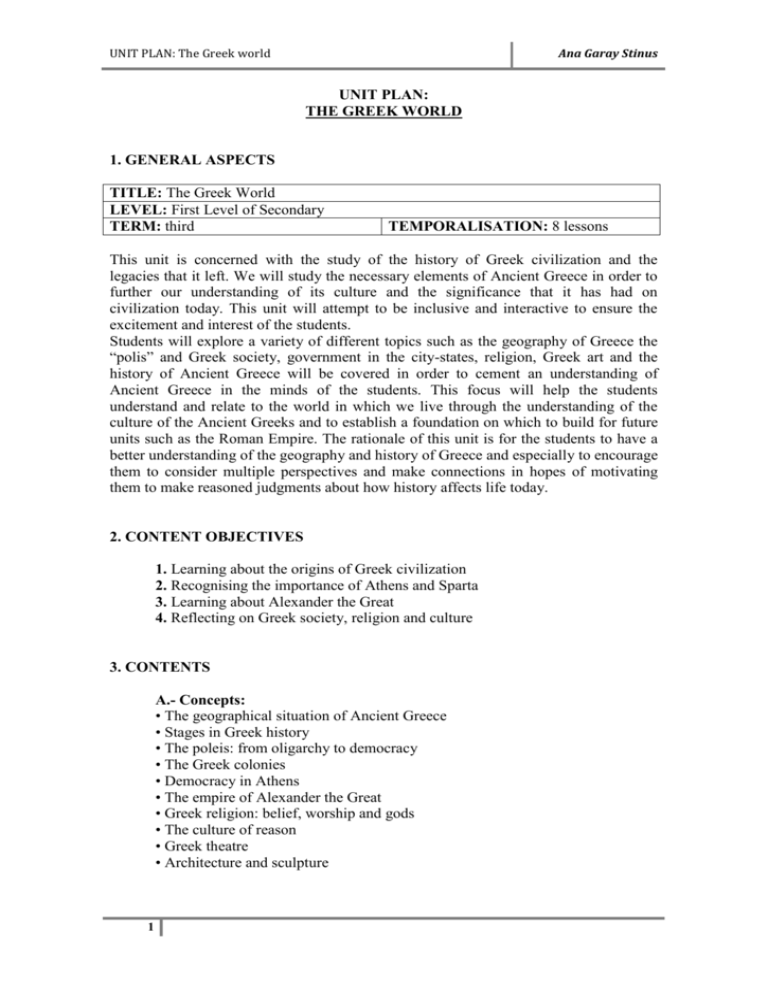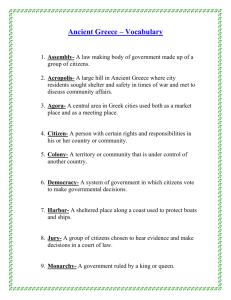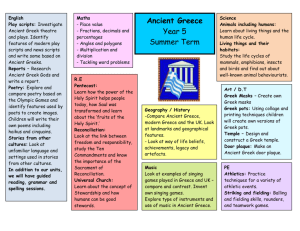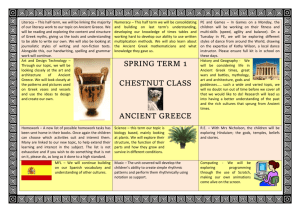
UNIT PLAN: The Greek world
Ana Garay Stinus
UNIT PLAN:
THE GREEK WORLD
1. GENERAL ASPECTS
TITLE: The Greek World
LEVEL: First Level of Secondary
TERM: third
TEMPORALISATION: 8 lessons
This unit is concerned with the study of the history of Greek civilization and the
legacies that it left. We will study the necessary elements of Ancient Greece in order to
further our understanding of its culture and the significance that it has had on
civilization today. This unit will attempt to be inclusive and interactive to ensure the
excitement and interest of the students.
Students will explore a variety of different topics such as the geography of Greece the
“polis” and Greek society, government in the city-states, religion, Greek art and the
history of Ancient Greece will be covered in order to cement an understanding of
Ancient Greece in the minds of the students. This focus will help the students
understand and relate to the world in which we live through the understanding of the
culture of the Ancient Greeks and to establish a foundation on which to build for future
units such as the Roman Empire. The rationale of this unit is for the students to have a
better understanding of the geography and history of Greece and especially to encourage
them to consider multiple perspectives and make connections in hopes of motivating
them to make reasoned judgments about how history affects life today.
2. CONTENT OBJECTIVES
1. Learning about the origins of Greek civilization
2. Recognising the importance of Athens and Sparta
3. Learning about Alexander the Great
4. Reflecting on Greek society, religion and culture
3. CONTENTS
A.- Concepts:
• The geographical situation of Ancient Greece
• Stages in Greek history
• The poleis: from oligarchy to democracy
• The Greek colonies
• Democracy in Athens
• The empire of Alexander the Great
• Greek religion: belief, worship and gods
• The culture of reason
• Greek theatre
• Architecture and sculpture
1
UNIT PLAN: The Greek world
Ana Garay Stinus
B.- Procedures:
• Interpreting historical maps and time lines
• Analyzing drawings and photos in order to obtain information
• Drawing maps to show Greek expansion
• Completing a chart to show differences between citizens and non-citizens
• Researching different topics: life in Athens, religion, sport, and important
figures
• Comparing sculptures from different periods in Greek history
• Analyzing a building and a sculpture
C.- Attitudes
• Curiosity about ways of life in the past
• Appreciation of the remains of Greek civilization and their role in telling us
about the past. Recognition of the need to preserve them
• Rejection of the discrimination against certain social groups in these
civilizations
• Understanding of the beliefs and way of life in other periods of history
4.- KEY COMPETENCES
• Vocabulary related to the civilization of Ancient Greece
• Pronunciation /t/: Democracy replaced aristocracy.
• Pronunciation /d/: They belonged to the same civilization.
• Pronunciation /id/: Greek civilization started in…
Digital ICT competence • Using primary and secondary sources to obtain
information
• Using texts, pictures and photos to obtain information
• Looking for information on the Internet and in
encyclopedias
• Making maps to express concepts such as territorial
Learning to learn
expansion
Interpersonal and civic • Comparing two political systems, aristocracy and
democracy, and relating them to our own political system
competence
• Understanding that territorial expansion takes place for
different reasons and has different results
• Understanding how the concept of citizenship is related to
political rights which some people possess and others do
not
• Showing empathy for people of other times, their
problems and feelings
• Using information to form reasoned opinions about
Autonomy and
slavery and the position of women
personal initiative
• Determining the space / time context of early Greek
Temporal competence
civilization
• Knowing about the people and events which were
fundamental in the history of Ancient Greece
• Explaining why the expansion of the city-states and
Hellenism were important
• Describing the main characteristics of life and society in
Linguistic
communication
2
UNIT PLAN: The Greek world
Cultural and artistic
expression
Knowledge and
interaction with our
world
Ana Garay Stinus
Ancient Greece
• Analyzing the effects of Ancient Greece on our politics,
town planning, art and science
• Situating on historical maps and time lines the events
studied
• Knowing the main examples of Greek art and their
features
• Analyzing the relation between art and the values of a
society
• Using the correct terms to describe art and architecture,
such as metope, pediment, cella
• Using basic guidelines to analyze buildings and sculptures
• Analyzing the importance of geographical factors in the
formation of the city-states
• Comparing the political systems of Athens and Sparta
• Differentiating the causes, development and effects of
Greek civilization
• Explaining the reasons for the wars in this period
• Comparing the Greece of city-states with the empire of
Alexander the Great
• Comparing the rights and freedom of different social
groups
• Identifying the factors which explain the location and
structure of the Greek city
5. LESSONS AND ACTIVITIES
LESSON
TITLE
Lesson 1:
The Greek
world.
Stages in Greek
History
Lesson 2: the
3
SPECIFIC
OBJECTIVES
Find the location of
Greece in the world.
Learn about the
geography of Greece.
Including the seas,
vegetation, and
climate.
How the geography of
Greece affected
society and its
development.
Where the major
settlements in Greece
were.
Learn about the
general characteristics
that all Greeks share.
Learn about the stages
of History of Ancient
Greece.
Realize that Athens
ACTIVITIES
RESOURCES
Introduction:
listening to and
answering some
questions about the
Greek world.
Analyzing the map
of Ancient Greece
to learn about its
geography
Lecture: the
geography of
Greece, one
civilization, and the
first Greeks.
Maps
PowerPoint
Lecture: the poleis
Pictures of agora
UNIT PLAN: The Greek world
poleis
Lesson 3: the
Greek colonies
Lesson 4:
Democracy in
Athens
Athen’s golden
age
Lesson 5. The
Empire of
Alexander the
Great
4
and Sparta were citystates that governed
themselves, like all
the other city-states.
Compare and contrast
the different forms of
government in Athens
and Sparta.
Know the two parts of
each polis and the
main buildings
Understand that
territorial expansion
takes place for
different reasons and
has different results.
Learn about the
characteristics of the
Greek colonies.
Name some areas
colonized by the
Greeks and the most
important colonies.
Explain democracy
and its birth
Learn about the main
institutions of
Athenian democracy
Understand how the
concept of citizenship
is related to political
rights which some
people possess and
others do not
Understand Greek
warfare
Recognize the
different
hegemonic
powers in Greece
and the influences
that they had on
other city-states
Learn about
Alexander the Great
Explain why the
expansion of the citystates and Hellenism
were important
Know the territories of
Ana Garay Stinus
Diagram: compare
and contrast the
governments of
Athens and Sparta.
and acropolis
Diagram of
governments
PowerPoint
Lecture: the
creation of the
colonies; the Greek
expansion
Analyze the map of
Greek migrations
(8th-6th centuries
BC)
Pictures of Greek
ship and colonies
Map of Greek
migrations (8th-6th
centuries BC)
PowerPoint
Describe the main
institutions of
Athenian
democracy using a
diagram.
Lecture: democratic
institutions;
Athen’s golden age
(Greco-persian
wars, the Delian
League,
Peloponnesian war)
Diagram of
Athenian
democracy
Diagram of social
groups in Athens
Text of Pericles
about democracy
Map of the Delian
League
PowerPoint
Read a text about
Alexander the
Great’s education
(Plutarch script)
Analyze the map of
Alexander the
Great’s Empire
Pictures of the
phalanx and the city
of Alexandria
Plutarch script
Map of Alexander
the Great’s Empire
PowerPoint
UNIT PLAN: The Greek world
Lesson 6. The
Greek religion
Lesson 7. The
culture of
reason.
The Greek
theatre
Lesson 8. Greek
architecture
and sculpture
5
Ana Garay Stinus
Alexander the Great’s
Empire and the cities
he found
Explain what
happened when
Alexander the Great
died
Understand the
meaning of Hellenistic
kingdoms
Know the importance
of the city of
Alexandria
Compare the
Greece of citystates with the
empire of
Alexander the
Great
Lecture: The
kingdom of
Macedonia and
Alexander the
Great; the
Hellenistic
Kingdoms
Learn about myth
and legend in
Ancient Greece
Recognize the
different Greek
gods and the
difference between
private and public
cults
Understand the legacy
of classical culture
Learn about the main
Greek philosophers
and scientists
Recognize the
difference between
comedy and tragedy
Identify the parts of a
Greek theatre
Define history,
legend, myth, and
religion.
Read a few
different
legends
Make a table
comparing the
Greek gods
Analyze why
Greece is
considered the
birthplace of
rational thought
Describe some
Greek inventions
Describe a Greek
theater
Lecture: Rational
thought; philosophy
and science; the
Theatre
Compare sculptures
from different
periods in Greek
history
Analyze a building
and a sculpture
Lecture: Greek
architecture (main
characteristics, the
classical orders,
temples and
theatres); Greek
sculpture (the
Know the main
examples of Greek art
and their features
Analyze the relation
between art and the
values of a society
Use the correct terms
to describe art and
architecture, such as
metope, pediment,
cella
Use basic guidelines
to analyze buildings
Diagram of the
Greek gods
PowerPoint
Pictures of Greek
inventions and of
the classical theatre
PowerPoint
Pictures of classical
orders, buildings
and sculptures
PowerPoint
UNIT PLAN: The Greek world
and sculptures
Ana Garay Stinus
periods)
6. RESOURCES
A.- Text Books:
BARCLAY, B., JÉGOU, R. & ALEJO ÁLVAREZ, J.A. Geography and History.
Bilingual Secondary Education. ESO 1. Granada: Lingua Frame, 2011.
Essential Geography and History 1. Madrid: Santillana, Richmond publishing, 2008.
GARCÍA SEBASTIÁN, M & GATELL ARIMONT, C. Social Sciences. Geography
and History 1.2. Barcelona: Vicens Vives, 2010.
Social Science. Madrid: Pearson Longman, 2010.
VVAA. 1 Secondary Education. Social Science. Basic concepts. Madrid: Anaya, 2010.
B.- Internet Resources:
Ancient Greece:
http://www.ancientgreece.com/s/Main_Page/
Ancient Greece Quiz:
http://www.historiasiglo20.org/MEC-BC/10.htm
Ancient History for kids and teachers:
http://ancienthistory.mrdonn.org/AncientGreece.html
Ancient Greece for kids:
http://www.chiddingstone.kent.sch.uk/homework/Greece.html
BBC. Ancient Greeks:
http://www.bbc.co.uk/schools/primaryhistory/ancient_greeks/
Greece (Historia siglo 20):
http://www.historiasiglo20.org/greece/index.htm
Greek Architecture and Sculpture:
http://blog.educastur.es/mrteacher/files/2009/05/greek-architecture-and-sculpture.swf
Greek religion:
http://blog.educastur.es/mrteacher/files/2009/05/greek-religion.swf
History for kids. Ancient Greece for kids:
http://www.historyforkids.org/learn/greeks/
The Greek Temple:
http://www.historiasiglo20.org/1ESO/greektemple.htm
6
UNIT PLAN: The Greek world
Ana Garay Stinus
7. ASSESSMENT CRITERIA
1. Applying the concepts of chronology, evolution and change to the events and
processes of ancient civilizations.
2. Differentiating the most relevant features of Ancient Greek civilization and
evaluating their influence on western civilization.
3. Showing comprehension of texts about history in oral or written form.
7










